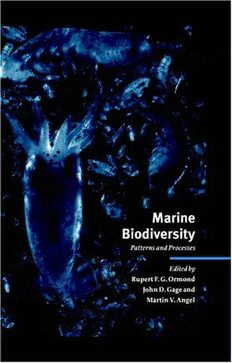
Marine Biodiversity: Patterns and Processes PDF
Preview Marine Biodiversity: Patterns and Processes
The biodiversity of many habitats is under threat and although seas cover the majority of our planet's surface, far less is known about the biodiversity of marine environments than that of terrestrial systems. It is also not clear whether many of the patterns known to occur on land also occur in the sea. Until we have a firmer idea of the diversity of a wide range of marine habitats and what controls it, we have little hope of conserving biodiversity, or determining the impact of human activities such as mariculture, fishing, dumping of waste and pollution. This book brings together key studies from the deep sea and open ocean to tropical shores and polar regions to consider how comparable the patterns and processes underlying diversity are in these different ecosystems. Marine Biodiversity will be a major resource for all those interested in biodiversity and its conservation. MARINE BIODIVERSITY: PATTERNS AND PROCESSES Acknowledgements This book was the direct outcome of a conference on 'Marine Biodiversity: Causes and Consequences' sponsored by the Marine Biological Association of the UK and the Scottish Association for Marine Science. This took place at the University of York, UK, and included presentations by the authors contributing chapters to this book. Additional support to the conference was provided by the UK Institute of Estuarine and Coastal Sciences, the University of Hull, the Marine Conservation Society, The Natural History Museum, London, and the World Wide Fund for Nature. Rupert F.G. Ormond John D. Gage Martin V. Angel MARINE BIODIVERSITY Patterns and Processes Edited by RUPERT F.G. ORMOND Senior Lecturer in Marine Ecology, Biology Department, University of York JOHN D. GAGE Senior Principal Scientific Officer and Senior Research Fellow, Scottish Association for Marine Science, Dunstaffnage Marine Laboratory, Oban and MARTIN V. ANGEL Senior Principal Scientific Officer, George Deacon Division, Southampton Oceanography Centre CAMBRIDGE UNIVERSITY PRESS PUBLISHED BY THE PRESS SYNDICATE OF THE UNIVERSITY OF CAMBRIDGE The Pitt Building, Trumpington Street, Cambridge, United Kingdom CAMBRIDGE UNIVERSITY PRESS The Edinburgh Building, Cambridge CB2 2RU, UK http://www.cup.cam.ac.uk 40 West 20th Street, New York, NY 10011-4211, USA http://www.cup.org 10 Stamford Road, Oakleigh, Melbourne 3166, Australia © Cambridge University Press 1997 This book is in copyright. Subject to statutory exception and to the provisions of relevant collective licensing agreements, no reproduction of any part may take place without the written permission of Cambridge University Press. First published 1997 Reprinted 1998, 1999 Typeset in Times 10/13pt System Miles 33 A catalogue record for this book is available from the British Library Library of Congress cataloguing in publication data Marine biodiversity : patterns and processes / edited by Rupert F.G. Ormond, John D. Gage, and Martin V. Angel. p. cm. Includes index. ISBN 0 521 55222 2 1. Marine biology. 2. Biological diversity. I. Ormond, Rupert. II. Gage, John D. III. Angel, Martin Vivian. QH91.57.A1M3 1997 574.57636—<lc20 96-9334 CIP ISBN 0 521 55222 2 hardback Transferred to digital printing 2002 RO Contents List of contributors page ix Foreword: The value of diversity. Sir Crispin Tickell xiii 1 Marine biodiversity in its global context. M. Williamson 1 2 Gradients in marine biodiversity. J.S. Gray 18 3 Pelagic biodiversity. M.V. Angel 35 4 Biological diversity in oceanic macrozooplankton: More than counting species. A.C. Pierrot-Bults 69 5 Large-scale patterns of species diversity in the deep-sea benthos. M.A. Rex, RJ.Etter and C.T. Stuart 94 6 Diversity, latitude and time: Patterns in the shallow sea. A. Clarke and J.A. Crame 122 7 High benthic species diversity in deep-sea sediments: The importance of hydrodynamics. J.D. Gage 148 8 Diversity and structure of tropical Indo-Pacific benthic communities: Relation to regimes of nutrient input. J.D. Taylor 178 9 Why are coral reef communities so diverse? A.J. Kohn 201 10 The biodiversity of coral reef fishes. R.F.G. Ormond and CM. Roberts 216 11 The historical component of marine taxonomic diversity gradients. J.A. Crame and A. Clarke 258 12 Population genetics and demography of marine species. J.E. Neigel 21A 13 Discovering unrecognised diversity among marine molluscs. J. Grahame, S.L. Hull PJ. Mill and R. Hemingway 293 14 Ecosystem function at low biodiversity - the Baltic example. R. Elmgren and C. Hill 319 vii viii Contents 15 Land-seascape diversity of the USA East Coast coastal zone with particular reference to estuaries. G.C. Ray, B.P. Hoyden, M.G. McCormick-Ray and TM. Smith 337 16. The development of mariculture and its implications for biodiversity. M.C.M. Beveridge, L.G. Ross and JA. Stewart 372 17. Protecting marine biodiversity and integrated coastal zone management. J.S.H. Pullen 394 18. Conserving biodiversity in North-East Atlantic marine ecosystems. K. Hiscock 415 Author index 429 Species index 437 Subject index 443 Contributors Martin V. Angel Institute of Oceanographic Sciences, Wormley, Godalming, Surrey, GU8 SUB, UK Present address, Southampton Oceanography Centre, Empress Dock, Southampton, SOU 3ZH, UK M.C.M. Beveridge Institute of Aquaculture, University of Stirling, Stirling, FK9 4LA, UK Andrew Clarke British Antarctic Survey, High Cross, Madingley Road, Cambridge CB3 OET, UK J. Alistair Crame British Antarctic Survey, High Cross, Madingley Road, Cambridge CB3 OET, UK Ragnar Elmgren Department of Systems Ecology, Stockholm University, S-106 91 Stockholm, Sweden Ron T. Etter Department of Biology, University of Massachusetts, Boston, MA 02125, USA John D. Gage Scottish Association for Marine Science, Dunstaffnage Marine Laboratory, P.O. Box 3, Oban, Argyll, PA34 4AD, UK J. Grahame Department of Biology, The University of Leeds, Leeds, LS2 9JT, UK John S. Gray Department of Biology, University of Oslo, Pb 1064, 0316 Blindern, Norway IX
